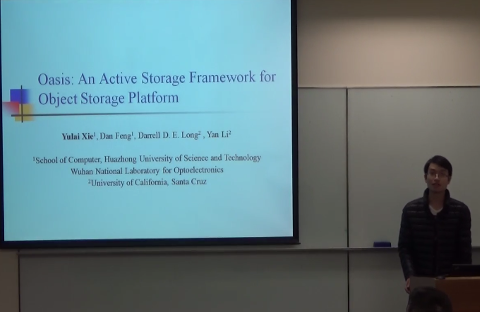
The network bottleneck incurred by big data process and transfer has increasingly become a severe problem in today’s data center and cloud storage. Exploring and exploiting the advantages of both the scalable object storage architecture and intelligent active storage technology are one of the ways to address this challenge. In this talk, we present the design and performance evaluation of Oasis, an active storage framework for object-based storage platform such as Seagate Kinetic. The basic idea behind Oasis is to leverage the OSD’s processing capability to run data intensive applications locally. In contrast with previous work, Oasis has the following advantages. First, Oasis enables users to transparently process the OSD object and supports different processing granularity. Second, Oasis can ensure the integrity of execution code using signature scheme and provide the access control for the code execution in the OSD by enhancing the existing OSD security protocol. Third, Oasis can partition the computation task between host and OSD dynamically according to the OSD workload status. Our work on Oasis can be integrated into Kinetic object storage platform seamlessly. Experimental results on widely-used real world applications demonstrate the performance and efficiency of our system.
Yulai Xie received the B.E. and Ph.D. degrees in computer science from Huazhong University of Science and Technology (HUST), China, in 2007 and 2013, respectively. He was a visiting scholar at the University of California, Santa Cruz in 2010 and a visiting scholar at The Chinese University of Hong Kong in 2015. He is now a postdoc fellow in the Institute of Network Coding of The Chinese University of Hong Kong. His research interests mainly include erasure-coded storage system, digital provenance, distributed file systems and computer architecture.
